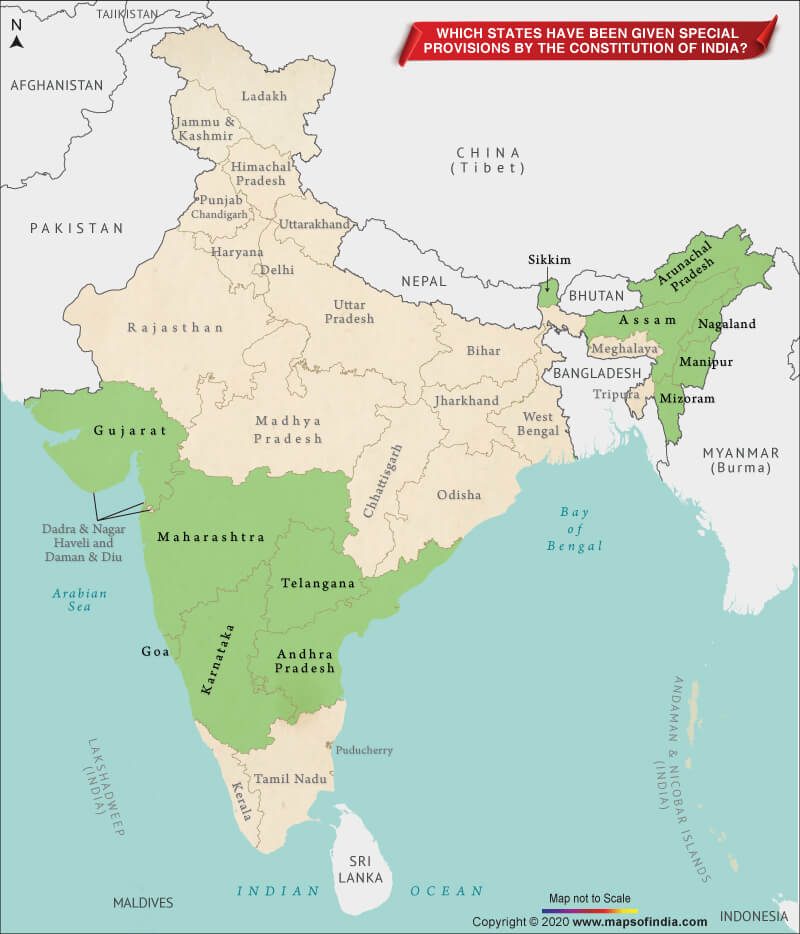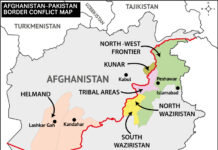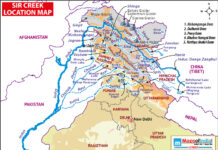

Indian constitution makes sure that regions, people, communities, and religions enjoy the right to equality. However, some states in India are at a disadvantage due to unavoidable historical reasons, hilly terrains, infrastructural & economic backwardness, strategic international borders, and non-viable state finances. To counter these, the constitution provided these states some special provisions.
There are a total of 11 states which enjoy these provisions. Below is their list.
1. Maharashtra and Gujarat
The President may provide for:
a. The separate development boards for Marathwada, Vidarbha and rest of Maharashtra, Saurashtra, Kutch district and the rest of Gujarat. A report stating development of these boards is evaluated each year by state legislative assembly.
b. Equitable allocation for developmental expenditure for these specific areas.
c. Arrangements for ensuring adequate facilities for vocational training, adequate employment opportunities, and technical education.
2. Nagaland
a. An Act of Parliament, unless the state assembly decides, would not apply in the matters of religious & social practices of Nagas, ownership & transfer of land & its resources, administration of criminal or civil justice that pertains to decisions according to Naga customary law.
b. Governor has a special responsibility to maintain law & order situation in Nagaland, in the light of disturbances in Naga hills. However, if the resident directs, the special responsibility ceases.
c. Governor has to make sure that the funds coming from the government of India for a specific purpose is utilised for that purpose only and not any other.
d. For the Tuensang district, a regional council is to be formed and the Governor has the duty to make all the terms and rules for this.
e. For the Tuensang district, some provisions will be operative for the period of 10 years from the formation of the state or further period as the Governor specifies. These are:
- Administration of the district is the responsibility of the Governor.
- On his/her discretion, the Governor decides the distribution of money between the rest of
- Nagaland and the district.
- There should be a minister in state assemblies for Tuensang affairs.
- Governor holds the right to take the final decision on all matters pertaining to the district.
- Members from the Tuensang district are not elected in the state assembly by people, but, in fact by the region council.
3. Assam
President has a say in the state’s committee of Legislative assembly. He/She can provide for functions of the committee for the state assembly and constitution. This generally consists of members elected from the state’s tribal areas as well.
4. Manipur
a. President has a say in the state’s committee of Legislative assembly. He/she can provide for functions of the committee for the state assembly and constitution. This generally consists of members elected from the state’s hilly areas as well.
b. President can also make the Governor hold special responsibility in order to ensure proper functioning of the committee.
c. Governor is required to submit a yearly report to the President concerning the administration of hill areas.
5. Andhra Pradesh
a. In the domains of education and employment, the President has the right to provide facilities and opportunities for people of the state.
b. President holds the right to direct the state government to arrange for civil posts in local cadre in the state.
c. In order to deal with matters related to allotment, appointment, or promotion on civil posts, the President may provide for the development of an administrative tribunal.
d. This tribunal is outside the purview of a high court and only the supreme court can exercise jurisdiction over it.
e. For the state of Andhra Pradesh, the Parliament can provide for the development of a university in the state.
6. Telangana
a. In the domains of education and employment, the President has the right to provide facilities and opportunities for people of the state.
b. In order to deal with matters related to allotment, appointment, or promotion on civil posts, the President may provide for the development of an administrative tribunal.
7. Sikkim
a. Legislative assembly shouldn’t have members less than 30. The assembly also needs to have 1 seat in the parliamentary constituency and 1 also in Lok Sabha.
b. Parliament holds the right to provide seats in the state’s administrative assembly to a section of the population that needs protection of their rights and interests.
c. Governor has the responsibility to make arrangement for socio-economic development and peace for different sections of the population.
8. Mizoram
a. The legislative assembly of the state can’t have members less than 40.
b. Act of parliament on certain matters (Mizo customary law & procedure, religious & social practices of Mizo, ownership & transfer of land & its resources, and administration of civil or criminal justice which involve decisions as per the Mizo customary law) would not be applied on the state except if the state assembly decides to.
9. Arunachal Pradesh
a. The Legislative assembly cannot have members less than 30.
b. Governor has a special responsibility for ensuring law and order in the state.
10. Goa
The Legislative assembly cannot have members less than 30.
11. Karnataka
The President may provide the Governor for special responsibilities for:
a. A provision for the establishment of a development Board
b. The board has the responsibility to allocate sufficient funds for the regions’ development.
c. Reservation is there in both government jobs and education sector.



